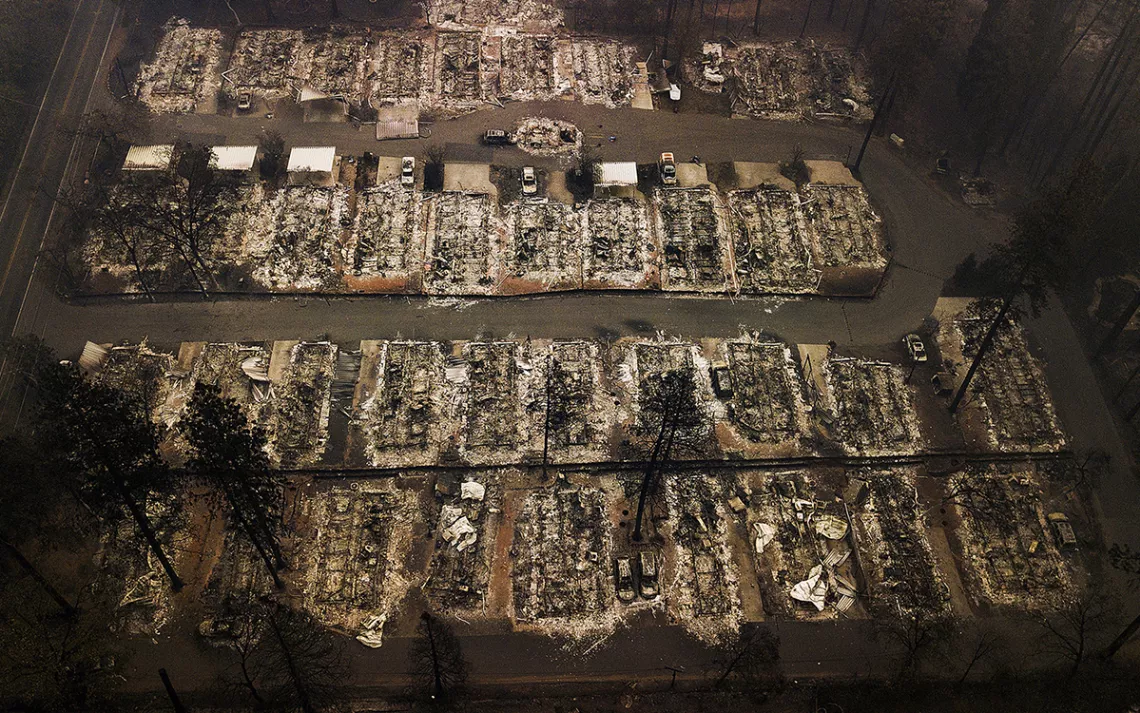A Place Called Paradise
A survivor of the Camp Fire considers resilience amid the climate crisis

The remains of residences leveled by the Camp Fire in Paradise, California, on November 15, 2018. | Photo by AP Photo/Noah Berger
When people used to ask me where I was from, they would smile and shake their heads in disbelief when I told them I was from Paradise. “Paradise?” they would say. “Where is that?”
Now, when I tell them I’m from Paradise, I’m met with a heaviness—a solemn reminder that my beloved hometown was destroyed by the deadliest and most destructive wildfire in California history.
California has always experienced wildfires. Now, though, the fires are becoming more frequent and more severe with each passing year. The more intense fires are an effect of climate change, as rising temperatures, unprecedented heat waves, and back-to-back droughts have gripped the state.
I’ll never forget November 8, 2018—the day that Paradise burned. My boss called me that morning just as I was about to walk out the door. “I heard on the radio that there is a fire in Butte County. It’s heading toward Paradise.” I wasn’t too concerned initially. There had been fires before, but they were never that serious.
I called my brother. He answered immediately.
“Hey, are you OK? I heard there’s a fire coming toward Paradise,” I said.
“No, Molly. It’s already here.”
I could hear the panic in his voice. He said he could see the fire coming over the ridge and hear exploding propane tanks in the distance.
“I gotta go,” he said. “I’ll call you when I can.”
The Camp Fire destroyed nearly 14,000 homes. My family’s house was one of them. Luckily, my loved ones escaped safely. But the friends and family of the 85 people who lost their lives will be forever scarred.
This story is not just about me—it’s about the billions of people across the world facing climate disasters that are becoming worse than ever. We’re all feeling the serious impacts of the climate crisis: We’re breathing polluted air, trying to stay cool in unprecedented heat, and packing emergency bags in case climate disasters force us to evacuate our homes.
This summer in particular has exemplified the relentless nature of the climate crisis. Heat is the number one cause of weather-related deaths, and rising temperatures are directly tied to the changing climate. The climate crisis is devastating families and communities across the nation as we continue to lose hundreds of Americans this summer due to heat waves. In my home state, we’ve already faced record drought, unbelievable heat waves, and more fires burning than ever. In July, Death Valley broke the all-time world heat record for the second year in a row. And the Bootleg Fire in southern Oregon—the largest active wildfire in the country—has displaced more than 2,000 people.
It is clear our infrastructure and lack of public services cannot meet the needs of our new climate reality. We must urgently invest in resilience measures to protect our families, our homes, and our most vulnerable. We already know wildfires are having a disproportionate impact on Black, Latino, and Indigenous communities. Native Americans, for example, are up to six times more likely than white communities to live in fire-prone areas.
Every single person deserves to live on a safe and habitable planet. We must forge a cohesive, diverse movement to end the injustices perpetuated by the fossil fuel industry, to save more lands and waters that can improve our climate resilience, and to advance the equitable solutions we need to fight climate change.
My own senator, Dianne Feinstein, has introduced the Wildfire Emergency Act, which prioritizes fire-smart communities—investing in critical infrastructure, energy grid resilience, forest restoration, and distribution of resources to our most at-risk neighbors. All these efforts will help improve our response and safety when the next Camp Fire arrives.
The reality is this: The longer we wait to deal with climate change, the more frequently we will hear of stories like my own. The cost of the climate crisis is certainly one that will have deep and long-term damage on our economy, but the loss of lives and the destruction of our towns and natural world are beyond anything we could even calculate.
2018 was when the climate crisis became a tragedy on my doorstep. In the last few years alone, we’ve seen how the disaster in Paradise turned into one of many. We must cultivate resilience in the face of the increasing consequences of the climate crisis. Through community-driven solutions, we will be able to combat climate disruption and work toward safer communities and a livable planet for everyone. This is our moment. We have no time to waste.
 The Magazine of The Sierra Club
The Magazine of The Sierra Club



